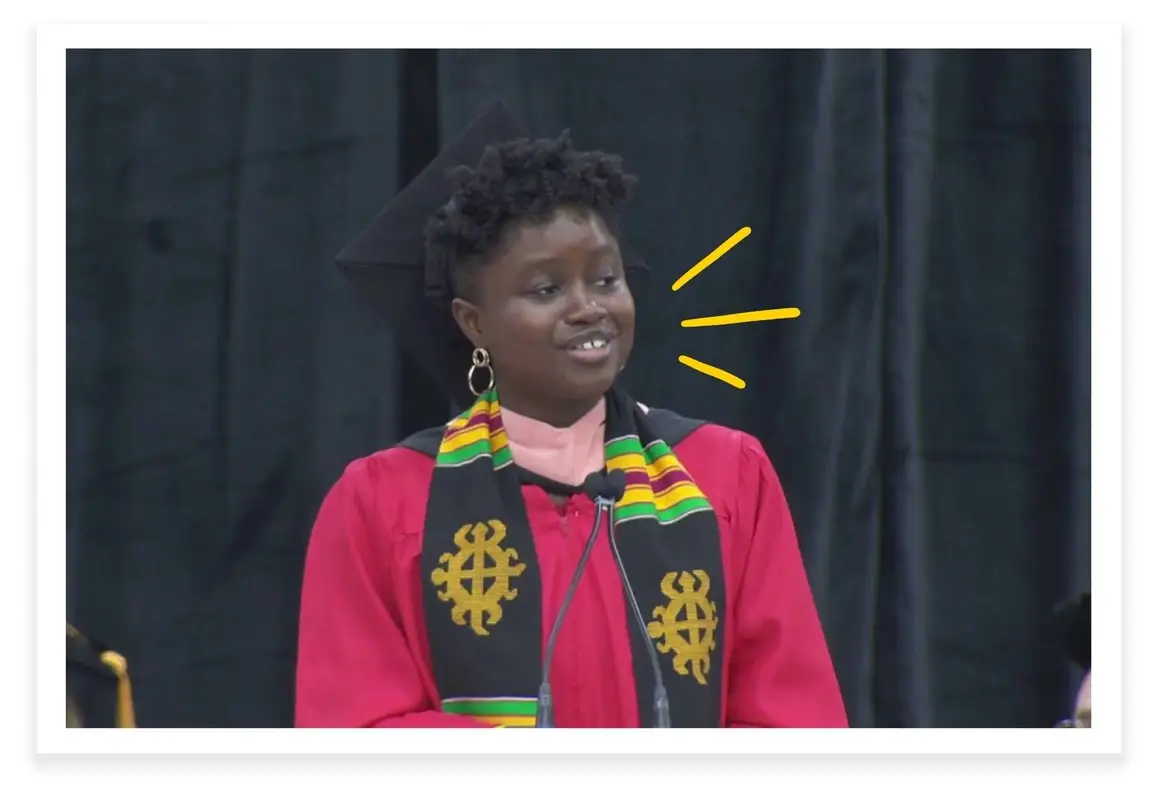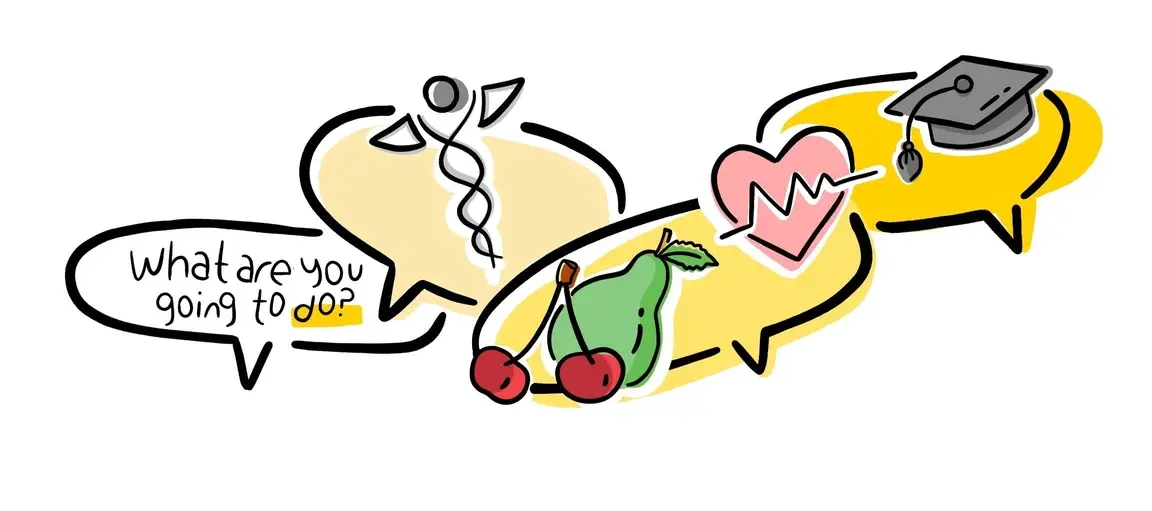From Idealist Grad School Fair to She Geeks Out | Fatima Dainkeh

Interested in learning more about which grad school programs can advance your social-impact career? RSVP for Idealist’s Grad School Fair in NYC on September 30, 2025!
As her college graduation approached, Fatima Dainkeh was already thinking about what would come next. “I was a religious studies major and anthropology minor, and I wasn’t really sure what I was going to do with that.” Fatima had started St. Mary’s College of Maryland as a pre-med student, but after taking several religion and anthropology classes, decided to change course.
“I’m into what people think about…and how that impacts how we think about each other,” she says. “I was anxious. My mom [didn’t know] that I had switched my major until the summer going into my senior year. She asked me, ‘What are you going to do with a religious studies and anthropology degree?’”

Reach out to advisors
Thanks to one of her undergraduate advisors, Fatima did have one potential lead. “I said, ‘I don’t want to go to medical school, but I’m really interested in the human-centered approach, how we think about things, what motivates us, and how that correlates with health.’” When Fatima’s advisor suggested she look into continuing her education in public health, something clicked. “By the time I graduated,” she says, “I thought, ‘Okay, this public health thing sounds like [something to] explore.’”
Your next steps:
- Contact your program’s department to connect with your undergraduate advisor. Talk to them about your trajectory and ask for any resources they might have to help you plan your next steps.
- You can also speak to your professors or even alumni. Ask them about their journey and consider how you can apply their experiences to your own.
Visit an Idealist Grad Fair
Though Fatima had been told public health may be a good fit, she wasn’t sure how her undergraduate degree might connect to a graduate program, so when St. Mary’s College organized a trip to the Idealist Grad School Fair in Washington D.C., she jumped at the opportunity to learn more.
At the table for Boston University School of Public Health, Fatima’s conversation with the admissions officer started off on a positive note. After Fatima told the admissions officer about her background and areas of interest, he told her, “That’s exactly who we’re looking for.” Fatima knew right then that Boston University would be a great fit. “The fact that he understood that religion and anthropology are connected to social determinants of health…was amazing for me,” she says. “He gave me his card and told me to check their website for more information. He even told me about funding, which was important for me. My family didn’t have any money, so I had to be strategic, and that meant applying for scholarships.”

Your next steps
Do some research on what grad programs are available and when application periods begin.
Visit an Idealist Grad School Fair near you for a deep dive into all the available continuing education opportunities.
Explore the Idealist Grad Schools program directory for options and information.
Seek out scholarships, fellowships, and financial aid
Prior relocating to Boston, Fatima secured the Whitney M. Young, Jr. fellowship through Boston University, which gave her an opportunity to acquire valuable work experience before grad school. “I knew that I had to do other things so I could say ‘Even though this was my major, this is the experience that I have.’”
That fellowship turned out to be the key to Fatima’s financial aid. “I was working in D.C. for a year doing social justice work, and there was one scholarship [related to social justice] that I didn’t know if I would get. I submitted the application anyway…and that fellowship paid for my tuition and housing for a year.”
Your next steps:
- Contact your program’s advisors and see if there are any continuing education scholarships available.
- Consider applying for internships and fellowships to help gain experience and broaden your horizons.
- Research scholarship options for graduate school.
Seek support from your institution
Moving to a new city for school can be difficult, so Fatima set out to find as many resources as she could—including reaching out to the university itself. “I found the house that I lived in [by reaching] out to Housing and Admissions,” she recalls.
Once in school, Fatima began to explore the curriculum and map out her career trajectory. “I wanted to focus on issues that were impacting the black and brown communities,” she says. “I ended up going into the Community Health Science department, and I focused on maternal child health and Community Assessment Program Design, Implementation, and Evaluation (CAPDIE). I had amazing professors in that department. They were very supportive, they understood my passion.”
Two years after attending the Idealist Grad Fair, Fatima was not only walking the graduation stage at Boston University’s School of Public Health, she was also giving the commencement speech. “The process, how amazing it was, from things seeming like it wouldn’t be possible…to being possible, was great,” she says. “Being on the stage and giving that speech, made it all worthwhile.”
Your next steps:
- See what housing resources your school offers for prospective and current students.
- Administrators and advisors can offer a wealth of information. Reach out and let them know what you need help with.
Find work that feeds your passion
Having earned her Master of Science in Public Health degree, Fatima was ready to start her career. “I thought to myself, ‘Maybe I can take all the skills I’ve learned understanding culture, religion, and health, and focus on being a facilitator. If I go to companies and talk about bias and microaggressions, perhaps that can allow people to be better humans.”
In July 2019, Fatima became a Diversity, Equity, and Inclusion (DEI) Facilitator for She Geeks Out, an organization dedicated to empowering women and others by supporting diverse and inclusive companies and organizations. “I transitioned to this company mainly because…I didn’t want to just focus on race and gender. I wanted to talk about the whole thing. If we get race and gender right, we [may not] get religious affiliation right. Or we won’t get people within the LGBTQIA community right.”
Your next steps:
- Explore what campus resources are available for students starting on their career path.
- Find ways to turn your student experience into a career.
- Review our tips on how to nail those job interviews.
Looking back on grad school fairs
With her career in full swing, Fatima has put her mother’s mind at ease about her academic choices. “I think to be able to do this and show that things are possible is not only an example for her,” Fatima says, “but also for [my] younger siblings and our nieces and nephews who might have been taught that there’s only one way to succeed.”
“I think it’s important to seek advice and support,” she adds, looking back on her grad fair and graduate school experience. “I didn’t do this by myself. There are people in life that will help you get to the next step, so be open to grad school being an option. Go to the grad fair and see what’s out there.”
Angel uses his skills as a storyteller to support and inspire job seekers and aspiring social-impact professionals.


